Dani Harper's Blog, page 14
February 23, 2014
BEWARE OF FAERIES - the message in my new paranormal fantasy STORM BOUND
 I know what you’re saying. Why would you need protection against a cute little faery? The truth is, in most countries where legends of faeries exist and where the belief in faeries lingers, many of the Fair Folk are not all that cute. Or little.
I know what you’re saying. Why would you need protection against a cute little faery? The truth is, in most countries where legends of faeries exist and where the belief in faeries lingers, many of the Fair Folk are not all that cute. Or little.And they definitely are not nice.
Legend has it that the term “fairy”, "fairie", "fae", or "faery" can be applied to a wide range of supernatural beings who possess considerable magical powers. Sprites, boggarts, pixies, banshees, brownies, hobgoblins, elementals, trolls, elves and many, many other creatures can all be lumped under the single heading of “faeries”.
According to the old stories, faeries could be so beautiful that mortals were unable to resist them, or so ugly that mortals could perish from fear. There were light faeries who were mostly good and dark faeries who were mostly evil. Still others were both friendly and hostile, helpful and mischievous, kind and cruel. This amoral unpredictability made most faeries very dangerous creatures. Your only hope as a mere mortal was to avoid the faeries, repel the faeries or appease the faeries.
AVOIDING FAERIES
 Fairy Mound in IrelandIn the Celtic countries (Scotland, Ireland, Wales and England), children used to be cautioned to stay away from
faery mounds
. These are strange solitary hills in odd places, such as the middle of a field. These round grassy knolls were believed to be entrances to the underground faery realm. Venture too close and you could disappear, never to be seen again. It was especially dangerous if you were a beautiful woman or a handsome man. You might be spirited away by faeries looking for a mortal mate!
Fairy Mound in IrelandIn the Celtic countries (Scotland, Ireland, Wales and England), children used to be cautioned to stay away from
faery mounds
. These are strange solitary hills in odd places, such as the middle of a field. These round grassy knolls were believed to be entrances to the underground faery realm. Venture too close and you could disappear, never to be seen again. It was especially dangerous if you were a beautiful woman or a handsome man. You might be spirited away by faeries looking for a mortal mate!Steer clear of certain trees late at night, especially hazel, thorn, alder and oak, because they’re favorite haunts for faeries. You could find yourself pinched and hit as you walk by – or tangled in the branches until morning.
Farmers knew better than to enter a mill at night. That was the time that faeries brought their grain to be ground. Interrupting faeries when they were working could earn you a failed crop or other curse.
 You needed to watch where you were walking because a strange tuft of grass or stray bit of sod could trigger a spell if stepped on. Your path through the woods could suddenly disappear. If you were crossing an open field, you might keep veering in the wrong direction or cross it only to arrive on the same side you started from. It’s called “being pixie-led” and it could happen in broad daylight.
You needed to watch where you were walking because a strange tuft of grass or stray bit of sod could trigger a spell if stepped on. Your path through the woods could suddenly disappear. If you were crossing an open field, you might keep veering in the wrong direction or cross it only to arrive on the same side you started from. It’s called “being pixie-led” and it could happen in broad daylight.Certain ponds, lakes and rivers were said to be the haunts of kelpies and other water faeries. If you came to these waters alone, you could be pulled in by these nasty creatures and drown. It was said that your spirit would then be forced to live in the faery realm forever. Stay away or use the buddy system.
REPELLING FAERIES
 St. John's WortGarlands were often made of marsh marigolds and hung over the barn doors to protect the horses from being ridden to exhaustion by faeries. Flowers, especially primroses, were spread over windowsills and hung above the door-posts of the house for safety. Your best bet, however, was a plant called St. John's Wort. Wearing it was said to provide strong protection from faery magic and mischief.
St. John's WortGarlands were often made of marsh marigolds and hung over the barn doors to protect the horses from being ridden to exhaustion by faeries. Flowers, especially primroses, were spread over windowsills and hung above the door-posts of the house for safety. Your best bet, however, was a plant called St. John's Wort. Wearing it was said to provide strong protection from faery magic and mischief.Faeries could vanish at will and remain invisible to mortal eyes as long as they pleased. Carrying a four-leafed clover would allow you to see the faeries – but only once. A Celtic tradition was to sew several of the clovers into a tiny bag to be worn around the neck. You could then discern the faeries once for each clover in the bag. In some legends, the clover was said to allow you to see through faery glamors and magical disguises.
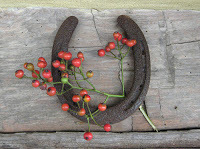 Iron in any form has always been the best protection against faeries – it was like kryptonite to Superman. If you kept an iron nail in your pocket, you couldn’t be carried away by them. A pair of iron shears hung on the wall near a baby’s bed was said to prevent the child from being swapped for an ugly faery baby. Horseshoes could be nailed over doorposts.
Iron in any form has always been the best protection against faeries – it was like kryptonite to Superman. If you kept an iron nail in your pocket, you couldn’t be carried away by them. A pair of iron shears hung on the wall near a baby’s bed was said to prevent the child from being swapped for an ugly faery baby. Horseshoes could be nailed over doorposts.Red berries kept faeries at bay, especially if they were from rowan trees, mountain ash or holly.
Even humble oatmeal was said to be a faery repellent, if you carried it in your pocket or sprinkled it on your clothes. As long as you didn’t mind looking flaky, you’d be safe.
APPEASING FAERIES
In many cultures, protection from faeries was achieved by cooperation and respect.
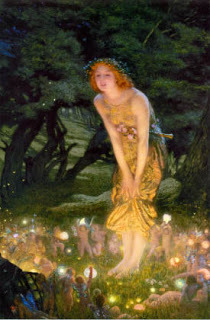 If you were Welsh, for instance, you might leave bread and milk on the back porch at night as an offering for the faeries. This was said to prevent them from playing pranks on the family and might even gain their favor. (Note – they liked butter, cream, and ale too. Especially ale.)
If you were Welsh, for instance, you might leave bread and milk on the back porch at night as an offering for the faeries. This was said to prevent them from playing pranks on the family and might even gain their favor. (Note – they liked butter, cream, and ale too. Especially ale.)If you spilled salt in Ireland, you might throw some over your shoulder in order to give the faeries their share. If you passed a body of water, or even a well, you could drop in a piece of silver for the faery that lives there. If you were milking a cow or goat by hand, you would probably let the first few squirts fall to the ground to appease any unseen faeries that were thirsty.
Many of the kindlier faeries were said to be offended when they saw a lack of hospitality and courtesy among human mortals, and would punish such offences severely. On the other hand, if you were fair and honest with your fellow mortals, and practiced generosity, the faeries were likely to treat you in kind. Or, at the very least, leave you safely alone!..................................................................................................................................


My new GRIM SERIES deals with the dangerous unpredictability of the Fair Ones, the Tylwyth Teg of Welsh faery folklore -- and the hapless mortals who run afoul of it.
Book 2, STORM BOUND, releases March 18th.
When a faery-cursed blacksmith meets a modern-day witch,
will he choose love --
or vengeance?
..................................................................................................................................
DANI'S GIVEAWAY
a Rafflecopter giveaway
Published on February 23, 2014 10:14
February 9, 2014
LOVE-STRUCK VALENTINE'S DAY HOP - goodies and giveaways and contests, oh my!
My new paranormal novels in the Grim Series ~ Storm Warrior and Storm Bound ~ are bringing ancient Welsh mythology into modern-day America! And in that spirit, I want to share the Welsh equivalent of Valentine's Day: it's St. Dwynwen's Day, and is celebrated each January 25.
 Dwynwen in the woods
In Wales, Dwynwen is the patron saint of lovers. She lived in the 5th century, and it was said that her outer beauty was matched only by the kindness of her heart. She fell deeply in love with a prince named Maelon. Her father, however, was determined that she would wed another man. Devastated that she couldn’t marry her true love, Dwynwen ran away into the woods and prayed that she might forget Maelon, and that he might forget her as well. An angel appeared bearing a sweet potion, designed to erase from her mind all memory of the prince. However, the magic elixir also turned the prince into a block of ice ~ because only ice could not feel love for her.
Dwynwen in the woods
In Wales, Dwynwen is the patron saint of lovers. She lived in the 5th century, and it was said that her outer beauty was matched only by the kindness of her heart. She fell deeply in love with a prince named Maelon. Her father, however, was determined that she would wed another man. Devastated that she couldn’t marry her true love, Dwynwen ran away into the woods and prayed that she might forget Maelon, and that he might forget her as well. An angel appeared bearing a sweet potion, designed to erase from her mind all memory of the prince. However, the magic elixir also turned the prince into a block of ice ~ because only ice could not feel love for her.
Charmed by the beauty of both her soul and her form, the angel made a gift of three wishes to the grief-stricken Dwynwen. First, she wished that Maelon be thawed and allowed to return to his home. Second, that she might play a role in fulfilling the hopes and dreams of true lovers. Third, that she should never have to marry. All three wishes were fulfilled, and Dwynwen devoted herself to her task for the rest of her life. St. Dwynwen's Well, Anglesey, Wales
Dwynwen founded a convent on the island of Llanddwyn, off the coast of Wales. On the island there is a well where, according to legend, sacred fish swim. It is said that the fish can predict the happiness of relationships.
St. Dwynwen's Well, Anglesey, Wales
Dwynwen founded a convent on the island of Llanddwyn, off the coast of Wales. On the island there is a well where, according to legend, sacred fish swim. It is said that the fish can predict the happiness of relationships.
Couples still go to the well today, hoping that the fish will be very active and stir up the water, meaning that true love and good luck will follow them. In some versions of the story, you must scatter breadcrumbs on the surface of the water, and then lay a handkerchief on top; if the fish disturb the handkerchief, then your love and luck are assured.
St. Dwynwen's Day is marked by the exchange of cards and gifts, music, parties and festivals. It has actually grown in popularity in recent years. But as proof that Wales is a very romantic country, they celebrate St. Valentine's Day as well!

 Book 1 of the Grim Series
Book 1 of the Grim Series
 Book 2 releases March 18th, 2014
Past and present collide as Celtic love, faery lore and human romance come together in modern-day America in The Grim Series.
Book 2 releases March 18th, 2014
Past and present collide as Celtic love, faery lore and human romance come together in modern-day America in The Grim Series.
Book 1 - Storm Warrior - When a pragmatic veterinarian unwittingly breaks an ancient Celtic curse, she finds the man of her dreams made flesh and blood, not by science but by powerful magic capable of fulfilling her greatest desires.
Book 2 - Storm Bound - When a wayward spell unites a modern-day witch and a cursed medieval blacksmith, their unexpected passion thrusts them into the path of an ancient, evil faery, in this second book of the Grim Series. Releases March 18th, 2014.
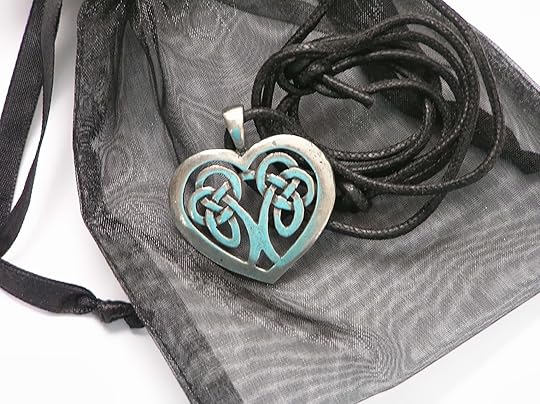 Celtic Heart Pewter Pendent
DANI'S GIVEAWAY
Celtic Heart Pewter Pendent
DANI'S GIVEAWAY
In honor of Valentine's Day AND my upcoming release in the Grim Series, one lucky winner is going to receive a deluxe tote bag with the newly-revealed cover of STORM BOUND on it, plus a Celtic heart pendent (pewter) and printed swag.
 Canvas tote with newest book cover!
To enter, please leave a comment telling me how you would LIKE to spend Valentine's Day if you could ~ and yes, you can let your imagination run wild! (My personal fantasy involves a trip to Wales, some chocolate syrup and my favorite hero...) Please include an email address so I can contact you if you win. One commenter will be drawn at random on Feb. 15th, 2014. Good luck everyone! Dani's giveaway is INTERNATIONAL!
Canvas tote with newest book cover!
To enter, please leave a comment telling me how you would LIKE to spend Valentine's Day if you could ~ and yes, you can let your imagination run wild! (My personal fantasy involves a trip to Wales, some chocolate syrup and my favorite hero...) Please include an email address so I can contact you if you win. One commenter will be drawn at random on Feb. 15th, 2014. Good luck everyone! Dani's giveaway is INTERNATIONAL!
And DON'T FORGET to enter the BIG KINDLE PAPERWHITE GIVEAWAY below as well!

 LOVE STRUCK BLOG HOP GIVEAWAY:
LOVE STRUCK BLOG HOP GIVEAWAY:
GRAND PRIZE -
KINDLE PAPERWHITE with 40 ebooks!
Contest runs from
Feb. 10 to Feb. 14th, 2014.
To enter the Kindle Giveaway,
go to J. A. Garland's site
and use the RAFFLECOPTER there:
http://jagarland.blogspot.com/2014/02/its-love-struck-valentines-day-blog-hop.html
 Dwynwen in the woods
In Wales, Dwynwen is the patron saint of lovers. She lived in the 5th century, and it was said that her outer beauty was matched only by the kindness of her heart. She fell deeply in love with a prince named Maelon. Her father, however, was determined that she would wed another man. Devastated that she couldn’t marry her true love, Dwynwen ran away into the woods and prayed that she might forget Maelon, and that he might forget her as well. An angel appeared bearing a sweet potion, designed to erase from her mind all memory of the prince. However, the magic elixir also turned the prince into a block of ice ~ because only ice could not feel love for her.
Dwynwen in the woods
In Wales, Dwynwen is the patron saint of lovers. She lived in the 5th century, and it was said that her outer beauty was matched only by the kindness of her heart. She fell deeply in love with a prince named Maelon. Her father, however, was determined that she would wed another man. Devastated that she couldn’t marry her true love, Dwynwen ran away into the woods and prayed that she might forget Maelon, and that he might forget her as well. An angel appeared bearing a sweet potion, designed to erase from her mind all memory of the prince. However, the magic elixir also turned the prince into a block of ice ~ because only ice could not feel love for her.Charmed by the beauty of both her soul and her form, the angel made a gift of three wishes to the grief-stricken Dwynwen. First, she wished that Maelon be thawed and allowed to return to his home. Second, that she might play a role in fulfilling the hopes and dreams of true lovers. Third, that she should never have to marry. All three wishes were fulfilled, and Dwynwen devoted herself to her task for the rest of her life.
 St. Dwynwen's Well, Anglesey, Wales
Dwynwen founded a convent on the island of Llanddwyn, off the coast of Wales. On the island there is a well where, according to legend, sacred fish swim. It is said that the fish can predict the happiness of relationships.
St. Dwynwen's Well, Anglesey, Wales
Dwynwen founded a convent on the island of Llanddwyn, off the coast of Wales. On the island there is a well where, according to legend, sacred fish swim. It is said that the fish can predict the happiness of relationships. Couples still go to the well today, hoping that the fish will be very active and stir up the water, meaning that true love and good luck will follow them. In some versions of the story, you must scatter breadcrumbs on the surface of the water, and then lay a handkerchief on top; if the fish disturb the handkerchief, then your love and luck are assured.
St. Dwynwen's Day is marked by the exchange of cards and gifts, music, parties and festivals. It has actually grown in popularity in recent years. But as proof that Wales is a very romantic country, they celebrate St. Valentine's Day as well!

 Book 1 of the Grim Series
Book 1 of the Grim Series
 Book 2 releases March 18th, 2014
Past and present collide as Celtic love, faery lore and human romance come together in modern-day America in The Grim Series.
Book 2 releases March 18th, 2014
Past and present collide as Celtic love, faery lore and human romance come together in modern-day America in The Grim Series.Book 1 - Storm Warrior - When a pragmatic veterinarian unwittingly breaks an ancient Celtic curse, she finds the man of her dreams made flesh and blood, not by science but by powerful magic capable of fulfilling her greatest desires.
Book 2 - Storm Bound - When a wayward spell unites a modern-day witch and a cursed medieval blacksmith, their unexpected passion thrusts them into the path of an ancient, evil faery, in this second book of the Grim Series. Releases March 18th, 2014.
 Celtic Heart Pewter Pendent
DANI'S GIVEAWAY
Celtic Heart Pewter Pendent
DANI'S GIVEAWAY In honor of Valentine's Day AND my upcoming release in the Grim Series, one lucky winner is going to receive a deluxe tote bag with the newly-revealed cover of STORM BOUND on it, plus a Celtic heart pendent (pewter) and printed swag.
 Canvas tote with newest book cover!
To enter, please leave a comment telling me how you would LIKE to spend Valentine's Day if you could ~ and yes, you can let your imagination run wild! (My personal fantasy involves a trip to Wales, some chocolate syrup and my favorite hero...) Please include an email address so I can contact you if you win. One commenter will be drawn at random on Feb. 15th, 2014. Good luck everyone! Dani's giveaway is INTERNATIONAL!
Canvas tote with newest book cover!
To enter, please leave a comment telling me how you would LIKE to spend Valentine's Day if you could ~ and yes, you can let your imagination run wild! (My personal fantasy involves a trip to Wales, some chocolate syrup and my favorite hero...) Please include an email address so I can contact you if you win. One commenter will be drawn at random on Feb. 15th, 2014. Good luck everyone! Dani's giveaway is INTERNATIONAL!And DON'T FORGET to enter the BIG KINDLE PAPERWHITE GIVEAWAY below as well!

 LOVE STRUCK BLOG HOP GIVEAWAY:
LOVE STRUCK BLOG HOP GIVEAWAY:GRAND PRIZE -
KINDLE PAPERWHITE with 40 ebooks!
Contest runs from
Feb. 10 to Feb. 14th, 2014.
To enter the Kindle Giveaway,
go to J. A. Garland's site
and use the RAFFLECOPTER there:
http://jagarland.blogspot.com/2014/02/its-love-struck-valentines-day-blog-hop.html
Published on February 09, 2014 09:26
February 4, 2014
GOODREADS GIVEAWAY - Win an ADVANCE COPY of STORM BOUND (Grim Series 2) by Dani Harper
.goodreadsGiveawayWidget { color: #555; font-family: georgia, serif; font-weight: normal; text-align: left; font-size: 14px; font-style: normal; background: white; } .goodreadsGiveawayWidget img { padding: 0 !important; margin: 0 !important; } .goodreadsGiveawayWidget a { padding: 0 !important; margin: 0; color: #660; text-decoration: none; } .goodreadsGiveawayWidget a:visted { color: #660; text-decoration: none; } .goodreadsGiveawayWidget a:hover { color: #660; text-decoration: underline !important; } .goodreadsGiveawayWidget p { margin: 0 0 .5em !important; padding: 0; } .goodreadsGiveawayWidgetEnterLink { display: block; width: 150px; margin: 10px auto 0 !important; padding: 0px 5px !important; text-align: center; line-height: 1.8em; color: #222; font-size: 14px; font-weight: bold; border: 1px solid #6A6454; border-radius: 5px; font-family:arial,verdana,helvetica,sans-serif; background-image:url(https://www.goodreads.com/images/layo... background-repeat: repeat-x; background-color:#BBB596; outline: 0; white-space: nowrap; } .goodreadsGiveawayWidgetEnterLink:hover { background-image:url(https://www.goodreads.com/images/layo... color: black; text-decoration: none; cursor: pointer; }
Goodreads Book Giveaway

Storm Bound
by Dani Harper
Giveaway ends February 24, 2014.
See the giveaway details
at Goodreads.
Enter to win
Published on February 04, 2014 20:33
January 21, 2014
COVER REVEAL - Storm Bound by Dani Harper
 STORM BOUND is Book Two in the Grim Series. Release date is March 18, but the story is available for pre-order NOW on Amazon (ebook, trade paperback or Audible).
STORM BOUND is Book Two in the Grim Series. Release date is March 18, but the story is available for pre-order NOW on Amazon (ebook, trade paperback or Audible).THE STORY:
Kidnapped on his wedding day in the twelfth century and forced into a thousand years of servitude by a cold-hearted faery princess, rugged blacksmith Aidan dreams of nothing but revenge on his captor. Then the spell of a beautiful witch awakens him to the present day—and a passionate desire. But to build a future, he must first confront his past…
Modern witch and magic-shop owner Brooke doesn’t think her life is missing anything, until a wayward enchantment lands a brooding medieval blacksmith in her spell room—and in her arms. Yet even after their passion proves to be truly magical, Aidan’s first commitment is to vengeance. Now Brooke must team up with friends and ancient warriors alike—and push her own powers to their limits—to save her love from the wrath of an evil fae.
"From the bestselling author of Changeling Moon, this thrilling and sensual novel adds a new chapter to Dani Harper’s Celtic folklore–themed Grim Series."
Now available for PRE-ORDER in ebook, trade paperback and audio from Amazon. (Pre-order Price Guarantee! Order now and if the Amazon.com price decreases between your order time and the end of the day of the release date, you'll receive the lowest price.)
Published on January 21, 2014 11:28
January 10, 2014
Got a Kindle Fire? Get STORM WARRIOR for 99 cents!
 Kindle FIRE customers can get
Kindle FIRE customers can getSTORM WARRIOR
by Dani Harper for just $0.99
PARANORMAL FANTASY: This is Book 1 of the Grim Series and you can read it before Book 2 comes out in March!
If you own a Kindle FIRE, you’ll see an offer on your device for a promo code that lets you purchase up to 10 selected Kindle ebooks for $0.99 each. (Sorry, this particular promotion is NOT for regular Kindles or Kindle Paperwhites)
Storm Warrior is one of the ten titles!
(TIME LIMITED! You only have until Jan. 16 to claim the credit and until Jan. 23 to redeem it!)

STORM WARRIOR received a starred review from PUBLISHERS WEEKLY: http://www.publishersweekly.com/978-1-4778-0594-7
About the story:
Two thousand years ago, Rhys was the fierce Celtic warrior branded by the Romans as “the Bringer of Death.” Mortally wounded in battle, he was captured by the Fair Ones, cunning and powerful masters of the Welsh faery realm. They spared his life…but for a price. As a grim, he has roamed the earth as a messenger of death—until a single act of kindness breaks the ancient enchantment and delivers him into a strange new world…
As a child, Morgan Edwards marveled at the faery tales spun by her beloved grandmother, stories of the magical beings hidden in the heart of ancient Wales. But now Morgan is all grown up, a veterinarian who believes only in what science can prove—until the night a massive black dog saves her from a vicious attack, and life as she knows it changes forever. Suddenly a stranger stands before her, the man of her dreams made flesh and blood not by science, but by a magic that could bring them their hearts’ desires...or cost them everything they have.
Published on January 10, 2014 16:27
January 8, 2014
YEAR OF THE HORSE - Chinese New Year 2014
 No doubt you’ve had fun reading the traditional Chinese zodiac printed on your restaurant placemat at one time or another. This system of 12 animal signs in a recurring 12-year cycle is called the Sheng Xiao and it’s been in use for over 4,000 years in China. The animals in order are Rat, Ox, Tiger, Rabbit, Dragon, Snake, Horse, Sheep, Monkey, Chicken, Dog, Boar. (Sometimes the Sheep is called a Ram, and sometimes the Boar is called a Pig.) Your animal sign is determined by your birth year.
No doubt you’ve had fun reading the traditional Chinese zodiac printed on your restaurant placemat at one time or another. This system of 12 animal signs in a recurring 12-year cycle is called the Sheng Xiao and it’s been in use for over 4,000 years in China. The animals in order are Rat, Ox, Tiger, Rabbit, Dragon, Snake, Horse, Sheep, Monkey, Chicken, Dog, Boar. (Sometimes the Sheep is called a Ram, and sometimes the Boar is called a Pig.) Your animal sign is determined by your birth year.2014 will be the Year of the Horse. Will be, because Chinese New Year is determined by the lunar calendar. This means it lands on a different day each year, and in 2014 it begins Jan. 31st. The Horse will rule until Feb. 18, 2015.
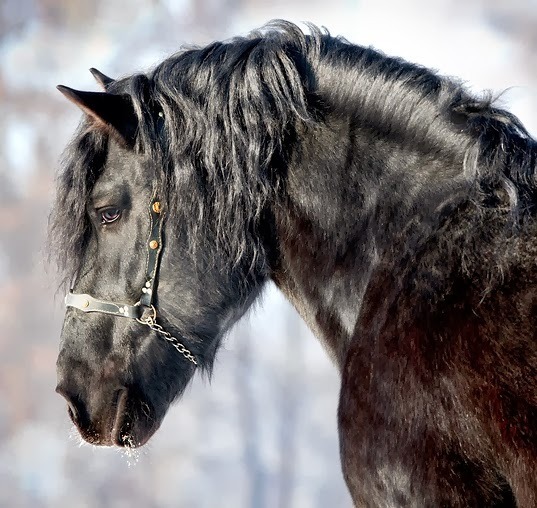 A Horse year is one that promises surprises in the area of adventure and romance, especially for those born in these years: 1918, 1930, 1942, 1954, 1966, 1978, 1990, 2002, and 2014. Horse people are said to be competitive and passionate, and to have strong qualities of leadership. The Horse is a social animal, and definitely connected to LOVE. It is also a sign of success and status.
A Horse year is one that promises surprises in the area of adventure and romance, especially for those born in these years: 1918, 1930, 1942, 1954, 1966, 1978, 1990, 2002, and 2014. Horse people are said to be competitive and passionate, and to have strong qualities of leadership. The Horse is a social animal, and definitely connected to LOVE. It is also a sign of success and status. What if the Horse is not your sign? No problem – a Horse year is favorable for many in the area of finance, travel, social endeavors and community events. People in general are said to be much more forgiving and tolerant in a Horse year. Plus it’s considered a good year in which to get married – unions created in the Year of the Horse are considered to be exceptionally happy and long-lasting.
 There are different types of Horses, however. Each year’s animal symbol is modified by one of five elements – Wood, Fire, Earth, Metal and Water. A Horse is the strongest of the Fire signs, but the year 2014 is influenced by the element of Wood. This is actually beneficial, because Wood helps Fire to burn! Wood is also related to nature and the color green, so you’ll see 2014 sometimes referred to as the Year of the Wooden Horse, or even the Year of the Green Horse.
There are different types of Horses, however. Each year’s animal symbol is modified by one of five elements – Wood, Fire, Earth, Metal and Water. A Horse is the strongest of the Fire signs, but the year 2014 is influenced by the element of Wood. This is actually beneficial, because Wood helps Fire to burn! Wood is also related to nature and the color green, so you’ll see 2014 sometimes referred to as the Year of the Wooden Horse, or even the Year of the Green Horse. So if Fire or Wood are your lucky elements (depending on your animal sign, plus the element that modified it in your birth year), then it’ll be a particularly good twelve months for you! A Wood year is considered ideal for everyone for teamwork or family endeavors.
May 2014 bring you many moments of warmth and joy and laughter, and also bring you closer to goals and dreams fulfilled.
Dani Harper www.daniharper.com https://www.facebook.com/Dani.Harper.Fan.Page
Your turn – what are some of your goals for 2014?
Published on January 08, 2014 16:47
December 26, 2013
15 Ways to make your New Year great! Traditions and customs from around the world.
 Most of the traditions connected with New Year's Eve and New Year's Day could be summed up in a single sentence:
Most of the traditions connected with New Year's Eve and New Year's Day could be summed up in a single sentence:“What you do is what you'll get!”
In many cultures, what you do for the first hour of the New Year signifies what you’ll do the most of for the next twelve months! (Does sleeping count?) Here are fifteen of the most common superstitions.
1. Working hard on New Year’s Day will ensure a whole year of grueling labor! But if you do a small token task successfully – something related to your employment – this will set the tone for achievement. (I'm definitely planning to write!)
2. If the house is clean by midnight on Dec. 31st, it’ll be clean for the entire next year. (Do I have to sort the closets too?) Don't sweep on New Year's Day or you'll sweep out all your good luck! Don't do dishes or laundry either or you'll "wash away" a member of your family in the coming year.
3. In many countries, it's believed that all debts should be settled before the New Year. Don’t pay back loans or lend money on New Year’s Day however, or you’ll be paying out all year long!
 4. If all your pockets and purses and wallets have coins and dollars in them by midnight, you’ll have plenty of money in the new year. (Note - it doesn't have to be large denominations - a penny and a one dollar bill will do it!) Holding a piece of gold or silver in your hand at the stroke of midnight will also bring prosperity. Some people place coins on windowsills and the tops of doors too.
4. If all your pockets and purses and wallets have coins and dollars in them by midnight, you’ll have plenty of money in the new year. (Note - it doesn't have to be large denominations - a penny and a one dollar bill will do it!) Holding a piece of gold or silver in your hand at the stroke of midnight will also bring prosperity. Some people place coins on windowsills and the tops of doors too.5. If you wear new clothes on New Year’s Day, more new clothes will come your way. (Does that include purses and shoes?)
6. No crying, fighting, arguing, name-calling or general negativity on New Year’s Day or you’ll have strife and tears all year long.
7. Don’t let valuable things leave your house on New Year’s Day or luck and fortune will go with them. The general belief refers to things like money and jewelry, but some people believe that nothing – not even garbage! – should leave the house on New Year’s Day. Take the empties to the recycling bin some other time!
8. Make sure the cupboards and pantries are full on New Year’s Day, in order to ensure abundance the rest of the year.
 9. Be careful with the dishes. If anything breaks on New Year’s Day, ill luck will follow. And if you break a mirror, the bad luck will be doubled. None of this applies, however, if you're Danish. They save up dishes all year to throw at the doors of their friends and neighbors. At the end of New Year's Day, the higher the pile of broken crockery on your front step, the more loyal friends you have.
9. Be careful with the dishes. If anything breaks on New Year’s Day, ill luck will follow. And if you break a mirror, the bad luck will be doubled. None of this applies, however, if you're Danish. They save up dishes all year to throw at the doors of their friends and neighbors. At the end of New Year's Day, the higher the pile of broken crockery on your front step, the more loyal friends you have.10. Working on New Year’s Day will ensure a year filled with grueling labor. But if you do a small token task – something related to your employment – successfully, it’ll set the tone for achievement in the coming months.
11. When midnight approaches, open all the windows and doors to let the Old Year leave. In some traditions, just opening one window or door will work. Releasing the Old Year makes room for the New Year. In Puerto Rico, people toss buckets of water out the windows to help to clean out the old year.
 12. Kissing at least one person at midnight ensures that love, friendship and affection will continue. To not give out a kiss indicates a long, cold and lonely year. (That’s dire – I’d kiss both my pugs to avoid a fate like that!). Kissing your spouse or your fiance is even better, ensuring that you'll live in love and happiness during the entire year to come.
12. Kissing at least one person at midnight ensures that love, friendship and affection will continue. To not give out a kiss indicates a long, cold and lonely year. (That’s dire – I’d kiss both my pugs to avoid a fate like that!). Kissing your spouse or your fiance is even better, ensuring that you'll live in love and happiness during the entire year to come.13. Bad luck and evil spirits must be driven away in order to make room for good fortune. This belief is at the root of using noisemakers to welcome in the New Year. The more noise you can make, the better. In early pioneer America. the firing of guns into the air was practiced. Church bells are often rung at midnight in many countries for the same reason.
In Iran, pots and pans are banged together. And the Chinese can be thanked for introducing fireworks to New Year's celebrations to chase away demons and bad fortune. In Wales, singing door to door does the job. My favorite is an Irish tradition which calls for banging on the walls and doors with Christmas bread to frighten evil spirits and invite good ones into the house. (Finally - a good use for that fruitcake!)
14. In keeping with the "getting rid of the old to make way for the new", residents of Ecuador burn pictures of things they don't want. Each family also creates a scarecrow or puppet which is called the "Año Viejo" or Old Year. Lists of problems and worries might be stuffed inside the effigies, as well as newspaper, wood and sawdust. Setting fire to these effigies is said to destroy any bad things that may have happened over the twelve months. Jumping over the fire brings extra luck. Versions of this practice can be found in other cultures as well. Burning the old calendar is popular almost everywhere.
 15. What you eat is said to influence your fortune for the coming year. It's lucky to eat black-eyed peas, and some say that one pea equals a coin you'll receive. Lentils will work too. But eating cabbage or other leafy greens might be more efficient – they're said to represent bills! Round foods are often synonymous with prosperity. In Spain and Portugal, they eat 12 grapes as the clock chimes midnight, ensuring 12 good months to come.
15. What you eat is said to influence your fortune for the coming year. It's lucky to eat black-eyed peas, and some say that one pea equals a coin you'll receive. Lentils will work too. But eating cabbage or other leafy greens might be more efficient – they're said to represent bills! Round foods are often synonymous with prosperity. In Spain and Portugal, they eat 12 grapes as the clock chimes midnight, ensuring 12 good months to come.Foods that form a circle or a ring, such as doughnuts, are popular in Europe. (Homer Simpson would like this one) The shape signifies that the year has come full circle and is now complete.
My wish for all of my readers is that 2014 will bring you many moments of warmth and joy and laughter, and also bring you closer to hopes and dreams fulfilled.
Dani Harper
http://www.daniharper.com/
https://www.facebook.com/Dani.Harper.Fan.Page
Your turn - What traditions did you grow up with? Have you heard of any that aren't listed here?
Published on December 26, 2013 23:20
December 23, 2013
CREEPY CHRISTMAS - SUPERSTITIONS & FOLKLORE II
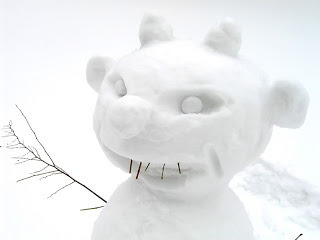 Last week's Christmas Superstitions included The Good, the Bad and the Scary. This week’s installment brings you some traditions that are downright creepy! They may not be true, but there's bound to be at least a couple that will give you a chill just the same.
Last week's Christmas Superstitions included The Good, the Bad and the Scary. This week’s installment brings you some traditions that are downright creepy! They may not be true, but there's bound to be at least a couple that will give you a chill just the same.Dogs that howl on Christmas Eve will go mad before the end of the year. A candle or a lamp should be kept burning all night on Christmas Eve to avoid a death in the house in the following year.
Instead of water turning into wine at midnight on Christmas Eve, some hold the belief that the water in streams and wells turns into blood! Not only that, if you witness this change, you’ll die within the year!
 A Scandinavian belief maintains that it's dangerous to go out on Christmas Eve because of the many supernatural beings that come out of their hiding places that night. Trolls, witches, goblins and ghosts are said to roam freely, including the spirits of the dead revisiting their previous homes. Gifts must be left outside – bowls of pudding and cream, clothes, tobacco and even ale – in order to appease some of these creatures. The most perilous time occurs between cock’s crow and dawn, when supernatural beings are at the peak of their power. To go outside means risking death or being carried off by them, never to be seen again.
A Scandinavian belief maintains that it's dangerous to go out on Christmas Eve because of the many supernatural beings that come out of their hiding places that night. Trolls, witches, goblins and ghosts are said to roam freely, including the spirits of the dead revisiting their previous homes. Gifts must be left outside – bowls of pudding and cream, clothes, tobacco and even ale – in order to appease some of these creatures. The most perilous time occurs between cock’s crow and dawn, when supernatural beings are at the peak of their power. To go outside means risking death or being carried off by them, never to be seen again.Swedish folklore puts a chilling twist on this story. On Christmas Eve, they prepare their dining room with food and ale and blazing fire – and leave it overnight to enable the spirits of the dead to celebrate undisturbed. The family checks the chairs in the morning for traces of earth, proof that the dead have come calling!
 Icelandic children lived in fear of being eaten by bloodthirsty ogres living in the mountains. The most ferocious of these was Mother Grýla, who wandered through the village at Christmastime with her evil cat.
Icelandic children lived in fear of being eaten by bloodthirsty ogres living in the mountains. The most ferocious of these was Mother Grýla, who wandered through the village at Christmastime with her evil cat.Instead of leaving out cookies for Santa, gifts and food had to be left out to appease the ogres. If they didn't like the offerings, they'd eat you. And if you didn't have at least one brand new article of clothing in honor of the season – the cat would eat you!
A once popular parlor game gave everyone an apple after dinner, which was then cut in half across the middle to reveal the pattern of the core. If the core is star-shaped (most apples have this), the owner of the apple will see another Christmas. If the core is a different shape, the owner’s death will occur in the next twelve months! The appearance of a four-pointed cross was worst of all – although what was worse than death is never mentioned.
Parlor games in Victorian England also included telling ghost stories by the fire, while keeping tabs on everyone’s shadow throughout the evening. If anyone’s shadow were to appear headless, that person would die within the coming year.
 While most cultures consider it lucky to be born on Christmas, others definitely do not. In Greece, any child born during the 12 days of Christmas is in danger of morphing into a kallikantzaroi, a malevolent half-animal, half-human monster that lives underground most of the year. Such a creature will almost certainly devour his own brothers and sisters!
While most cultures consider it lucky to be born on Christmas, others definitely do not. In Greece, any child born during the 12 days of Christmas is in danger of morphing into a kallikantzaroi, a malevolent half-animal, half-human monster that lives underground most of the year. Such a creature will almost certainly devour his own brothers and sisters!In Romania, Poland and Moldova, a child born on Christmas Day may become a werewolf. A different variation on this tale is that any child conceived during Advent (when parents apparently were supposed to abstain from such activities) was almost certainly doomed to become a were-animal by the time they reached adulthood. In some Slavic regions, a child be born anywhere between Christmas and Ephiphany will surely become a vampire after death.
To avoid bad luck, all Christmas decorations should be taken down by Candlemas (Feb. 2). However, make sure you clean up after them – every needle left behind in the house from the Christmas tree will cause the sighting of a spirit or a demon in the coming year. Some believe a stray needle or berry will result in a death in the family. (A good case for having an artificial tree!)
The danger isn't over once the decorations are down because a Christmas tree thrown outside will attract the attention of evil spirits and supernatural beings. For proper disposal, the tree must be burned immediately.
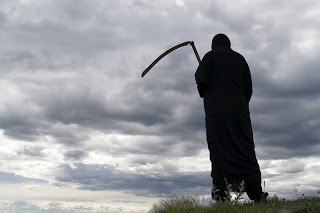 An old Breton tale tells the story of a blacksmith who refused to stop working after the church bell had rung for Midnight Mass on Christmas Eve. Suddenly a tall man entered his shop with a scythe that needed mending.
An old Breton tale tells the story of a blacksmith who refused to stop working after the church bell had rung for Midnight Mass on Christmas Eve. Suddenly a tall man entered his shop with a scythe that needed mending.The blacksmith did the work but the mysterious man refused to pay him. Instead, he told the blacksmith to send for a priest because this work would be the last he would ever do. By the time the roosters crowed on Christmas morning, the blacksmith was dead. He had mended the Scythe of the Grim Reaper himself.
Wishing you a merry-not-too-scary holiday season!
Dani Harper
http://www.daniharper.com/
https://www.facebook.com/Dani.Harper.Fan.Page
Published on December 23, 2013 08:29
December 21, 2013
CHRISTMAS SUPERSTITIONS and FOLKLORE, Part 1
 Tis the season to dust off favorite blogs of Christmases past (or it is if you're working on a deadline...). For anyone who might have caught this one a couple years ago, hope you enjoy it a second time!
Tis the season to dust off favorite blogs of Christmases past (or it is if you're working on a deadline...). For anyone who might have caught this one a couple years ago, hope you enjoy it a second time!As you know, I just can’t resist anything related to the paranormal. But Christmas? Who would have suspected that there was anything supernatural about such a warm fuzzy holiday? I mean, a big jolly fellow travels all over the world with his flying reindeer in a single night, squeezes down tiny chimneys with a neverending bag of presents, knows if you’re naughty or nice but is never seen himself… Come to think of it, that IS pretty paranormal!
I had a lot of fun researching Christmas superstitions and I was amazed by how MANY there were! In fact, there’s so much material I’ve decided to blog twice about this topic. Here then is the first installment. (By the way, here's the official disclaimer -- Remember, these are folktales and traditions, and not intended to be taken as truth!)
The Good….
Unmarried girls can cut a twig from a cherry tree on St. Barbora’s Day (Dec. 4th) and put it in water. If it blooms by Christmas Eve, marriage will follow within the year. Counting the stars on Christmas Eve will foretell the number of sheaves in your harvest. And if you see the sun shining through the limbs of the apple trees on Christmas Day, there’ll be an abundance of fruit the following year.
If you dream on any of the 12 nights between Christmas and Epiphany (Jan. 6), your dreams will come true in the next year. The first person in the household to hear a rooster crow or anyone who hears a cricket chirp on Christmas Day is going to have a very lucky year. Good luck follows those who give money to the poor on Christmas Day, to those who eat their breakfast by candlelight, and to those who stir the Christmas pudding.
The Bad….
Bad, bad fortune follows those who leave the dishes unwashed on Christmas Eve (and that’s on top of what Mom will do to you!). On Christmas Day, it’s unlucky to leave the dinner table before everyone has finished. A full moon on Christmas predicts a scanty harvest in the year to come. If Christmas Day falls on a Thursday, a year of windy weather is forecast.
On Christmas Eve it’s said that you can hear the bells of lost churches that have been covered by floods or buried by landslides and earthquakes. Picking up nuts or fruit from the ground will bring bad luck. So will sending carolers away without treats or money. And you really don’t want to be the first one home from church!
And the Scary….
A piece of winter greenery (holly, mistletoe, evergreen, etc.) must be brought into your home during the Christmas season, to keep away evil spirits. However, every winter leaf left in the house after Candlemas (Feb. 2) will result in the sighting of a ghost, or perhaps even a death in the house during the coming year! Mistletoe must be burned, or those who kissed beneath it will become enemies.
Those born on Christmas Day are rumored to be able to see ghosts and spirits. And those who are born on Christmas Eve are said to turn into ghosts themselves on that day every year! (Wow, this sounds more like Halloween, doesn’t it?) The only way to avoid this odd fate is to remain awake the entire night until Christmas Day dawns.
That's all for this post. Watch for more on Christmas superstitions!
Dani Harper
http://www.daniharper.com/
https://www.facebook.com/Dani.Harper.Fan.Page
Published on December 21, 2013 11:55
December 18, 2013
MISTLETOE - History, Myths and Legends
 -- Mistletoe is the official state flower of Oklahoma! --I'm still trying to make deadline with a novel, so I thought I'd re-share one of my my most popular posts this holiday season....
-- Mistletoe is the official state flower of Oklahoma! --I'm still trying to make deadline with a novel, so I thought I'd re-share one of my my most popular posts this holiday season.... Today we use mistletoe as a Christmas decoration (and occasionally steal a kiss under it). But mistletoe has a much longer history than Christmas itself.
Mistletoe is unusual in the plant world because it doesn’t grow in the earth at all. Instead, it’s an aerial parasite that lives only in the boughs of trees. This uncommon plant not only remains green throughout the winter, but produces its pure white berries right around the time of the winter solstice.
The ancient Celts believed mistletoe to be a sacred gift from the gods. The Romans recorded that the Celts would harvest mistletoe from a tree after the winter solstice. A druid – a Celtic priest – used a golden sickle to cut the plant. It was vital that the mistletoe never come in contact with the ground and so a white cloth was held beneath the tree to catch it. Two white bulls were then sacrificed to honor the god who provided the mistletoe and to petition him to increase the plant’s potency.
The druids were said to be skilled in both herbs and magic, and the mistletoe was one of the most powerful plants in their arsenal. A symbol of immortality, mistletoe was believed to have protective powers against evil spirits and the ability to heal diseases. Although mistletoe is a poisonous plant itself, in skilled hands it was considered to be an antidote to all poisons. It was also used to promote fertility of both animal and human and occasionally even used in aphrodisiac potions. This sacred plant was associated with good fortune and great blessings.
 The mistletoe was so sacred that if enemies met in a forest and a mistletoe plant was spotted overhead, an automatic truce was declared until the following day. From this grew the practice of hanging mistletoe over the door, or suspending it from the ceiling as a symbol of peace and good will.
The mistletoe was so sacred that if enemies met in a forest and a mistletoe plant was spotted overhead, an automatic truce was declared until the following day. From this grew the practice of hanging mistletoe over the door, or suspending it from the ceiling as a symbol of peace and good will.The Norse myth of Baldur takes us to the next phase of mistletoe tradition. The goddess, Frigga, was Baldur’s mother, and exacted a promise from every element, plant and animal, both on the earth and under the earth, not to harm Baldur. She forgot the mistletoe, which grows neither in the ground or on it. Loki, prankster and god of evil, tricked another god into shooting Baldur with an arrow made of mistletoe, which killed him. Fortunately, Balder is eventually brought back to life. His mother is so overcome with joy that she reverses the reputation of the offensive mistletoe, declaring that those who passed beneath a mistletoe plant should have a token kiss and be kept safe from harm.
Centuries later, both Celtic and Viking traditions were condemned by early Christianity as pagan, and mistletoe was forbidden to be displayed within sight of the church. However, that didn’t stop people from hanging mistletoe in their homes and barns or from wearing sprigs of it to ward off disease and evil. Mistletoe became known as All-heal, and is still used in homeopathic medicine.
It wasn’t until Victorian times that the plant’s original status as a symbol of peace and love was revived, and the practice of kissing under the mistletoe was reinstated.
Dani Harper
www.daniharper.com
Your turn --- In your wildest fantasy, who would YOU like to meet under the mistletoe?
Published on December 18, 2013 07:41



